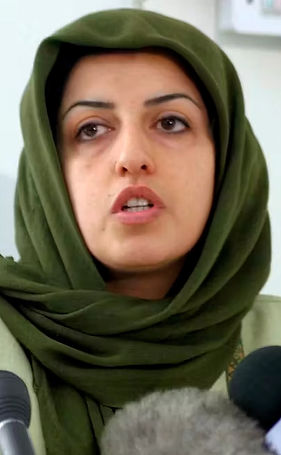Seven ways feminism has improved the world for young women
compared to our mothers' generation
International Women’s Day is the perfect time to celebrate how far we’ve come in transforming the lives of women and girls around the world.
Historically, women have faced subjugation and limited freedom, with societal expectations confining us to marriage and child-rearing.In the UK, the suffragette movement in the early 20th century was a pivotal moment in the fight for women’s rights.


How women’s basic rights and freedoms are being eroded all over the world
From Iraq to Afghanistan to the US, basic freedoms for women are being eroded as governments start rolling back existing laws.
Just a few months ago a ban on Afghan women speaking in public was the latest measure introduced by the Taliban, who took back control of the country in 2021. From August the ban included singing, reading aloud, reciting poetry and even laughing outside their homes.
IRAN
Iundressing protest shows how women are still fighting even as morality laws get harsher
More than two years have passed since a young woman called Mahsa Amini died in police custody after being arrested in Iran for allegedly not wearing her hijab properly. Her death sparked mass protests throughout Iran against the country’s ruling theocracy.
The fight of Iranian women for freedom and bodily autonomy now rages on. Ahou Daryaei, a 30-year-old French language student at Tehran’s Islamic Azad University, has become the latest symbol of this resistance.


Narges Mohammadi
2023 Nobel peace laureate on hunger strike after being denied medical treatment over hijab ban
Narges Mohammadi, the recipient of the 2023 Nobel peace prize for her long fight against the oppression of women in Iran, is reported to have started a hunger strike. Her family told CNN this week that she began refusing food on Monday in protest over what she said was the jail’s refusal to provide her with medical treatment.
Nobel Peace Prize
Narges Mohammadi wins on behalf of thousands of Iranian women struggling for human rights
Prominent Iranian women’s rights advocate Narges Mohammadi has won the 2023 Nobel peace prize for her long fight against the oppression of women in Iran. Mohammadi is serving multiple prison sentences in Evin prison in Tehran on charges which include spreading propaganda against the state. She was named by the committee for “her fight against the oppression of women in Iran and her fight to promote human rights and freedom for all”.


Afghanistan
after a year of Taliban government, women are more oppressed than ever
The recent announcement that women and girls in Afghanistan have been banned by the Taliban government from visiting parks and gyms – even if accompanied by a male “chaperone” – has understandably been greeted with outrage.
The UN special representative in Afghanistan for women, Alison Davidian, said it was “yet another example of the Taliban’s continued and systematic erasure of women from public life,” adding, “We call on the Taliban to reinstate all rights and freedoms for women and girls.”
afghanistan
the west needs to stop seeing women as in need of ‘saving’
The west has long had a fascination with “saving” Afghan women – a theme we have seen in many media reports since August when Kabul fell to Taliban forces. It was a narrative which was also front and centre in 2001 when the administration of US president George W Bush launched the “war on terror” and the invasion of Afghanistan, with his wife Laura claiming that “the fight against terrorism is also a fight for the rights and dignity of women”.


meet hind elhinnawy
the ِِEgyptian Woman Who Defied the Social Norms
After stirring up controversy in the Egyptian society for being the first young women to file a paternity suit in 2005, Hind Elhinnawy shied away from the public life to raise her daughter. Leena Alfishawy, daughter of Elhinnawy and actor Ahmed Alfishawy was born out of an Urfi marriage, which Alfishawy denied after Elhinnawy got pregnant. Instead of having an abortion, the young mother-to-be defied the social norms of women in her situation and fought for her daughter’s right to live. In an unprecedented step, she publicly took Alfishawy to court, but he refused a court ruling to undergo a DNA test to prove his paternity.
Over a decade ago I made legal history in Egypt, but to fight for women's rights we need to change the culture, not just the laws
It was almost 15 years ago that I became pregnant, and instead of quietly getting it “taken care of”, I decided to keep the baby and challenge the social norms of my country of origin. Having a child from an unofficial urfi marriage, in a country like Egypt, meant a scandal for my family and I, as they have no official contract and are often kept secret.
Under Egyptian law, without an official marriage contract, only a man can register a child’s birth. As a result, tens of thousands of children are legally non-existent; they cannot be issued birth certificates, passports, receive vaccinations, register for school or even get married.


sisterhood
being a feminist in Arab Muslim societies
Being a woman in the Arab Muslim world is not easy. Almost all Arab women of all backgrounds, classes, ages or even religions face some sort of sexism in their life – and I’m one of them. That is not to say that misogyny is special to the Arab world; every society in history has struggled with sexism. The problem with the Arab world, however, is that on top of sexual harassment, high rates of female genital mutilation, ongoing economic disempowerment, restrictive and discriminatory family laws, and more, women are often shamed, marginalised, and even blackmailed simply for addressing issues that are deemed culturally inappropriate.
